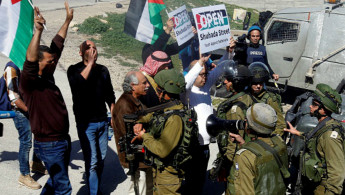Ibrahimi mosque massacre anniversary marked by Palestinians
Dozens gathered peacefully to remember the 1994 massacre that killed 29 and wounded 125 when an American-Israeli settler opened fire on Muslims praying at the Ibrahimi Mosque in the southern West Bank.
Baruch Goldstein, a member of the banned ultra-right wing messianic Kach movement, gunned down Muslim worshippers on 25 February 1994 before he was beaten to death by survivors.
Israeli forces soon declared a "closed military zone" in nearby key thoroughfare named al-Shuhada Street, restricting Palestinians' access.
Protesters on Friday called for the reopening of the street as activists took to social media using the hashtag #OpenShuhadaSt.
Palestinian protesters also slammed the Israeli regime's illegal restrictions and settlement expansion in occupied territories.
Israeli troops soon dispersed the demonstrators, with a Palestinian journalist and a protester both detained at the scene.
Amnesty International condemned the Israeli aggression towards Palestinians and also called for the re-opening of al-Shuhada Street.
"As Palestinians in Hebron mark 22 years since the Israeli authorities first closed al-Shuhada Street in the Old City, Amnesty International is today calling on the Israeli authorities to life the discriminatory restrictions and end the collective punishment of Palestinians," Amnesty International said in a report.
A few hundred Jewish settlers continue to live under heavy Israeli army guard in the heart of the West Bank among 200,000 Palestinians in the city.
 |
| A few hundred Jewish settlers live in Hebron, under heavy Israeli army guard [Getty] |
This has led to growing tensions between Palestinians and Israelis over the transfer of populations to military occupied territory, which is illegal under international law.
At least 190 Palestinians have been killed by Israeli fire since October, 32 of them under the age of 18.
Israel says a Palestinian campaign of incitement is fanning the violence.
The use of force by Israeli security services has been subject to heated international debate after Sweden's foreign minister last month said Israeli forces may be guilty of extrajudicial killings.
The comments were condemned by Israeli Prime Minister Binyamin Netanyahu.





 Follow the Middle East's top stories in English at The New Arab on Google News
Follow the Middle East's top stories in English at The New Arab on Google News


